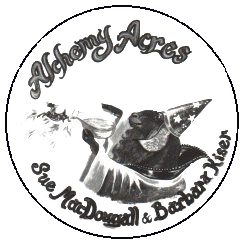
















A (long) while back, Paul Hamby wrote an article on commercial goat dairys. He gave me permission to reprint it in one of my "Tips of the Month". Thanks Paul. So here goes.
The commercial goat dairy business is alive and well ...... well, pretty small, but there is a healthy commercial goat dairy business out there (even in Athens, TN, where Jerry Swafford is starting up a Grade A goat dairy), and there is more demand than product available. Consumers are willing to pay "profitable prices" for value-added dairy products. Goat milk is already a value-added product compared to cow milk because of its health benefits. The value of goat milk is increased when produced without BST, hormones, antibiotics, preservatives, homogenization, etc.
The value is increased even more when it is turned into a product such as flavored Chevre, yogurt, ice cream, flavored milk, butter, candy, etc. Good news - Farm based processing is making a comeback. "Micro Creamery (term stolen from micro brewery) is the way to produce and sell value-added dairy products. Consider this! The wholesale price of goat milk is about $2.50 to $3.50 a gallon. First problem is that most areas of the country do not have a processor who buys goat milk. Second problem is that it is hard to make any profit selling milk at wholesale prices. The retail price of goat milk and processed goat milk products ranges from $10 to $40 per gallon (bottled milk, cheese, yogurt, ice cream, etc.) At the retail or processor level you can build a profitable business. Commercial dairying is not for everyone. An investment varying between $100,000 and $1,000,000 is required. The ability to hire and manage people is required. It takes more than two people to feed and care for the goats, milk the goats, process the milk, deliver the milk, cheese and yogurt to the stores, deliver kids, do the bookkeeping, and cook supper. The number of employees ranges from five to seventeen (according to the Hamby survey)on the farms who process their own milk.
Housing ranged from total confinement to grazing systems with open housing for bad weather. Goats who got plenty of exercise seemed to have less problems and less feet trimming was required. Bedding materials included wood chips, straw, smooth 3/4" gravel, and sanitary sand. All goat dairys practice CAE prevention programs. Commercial herd animals are frequently in better overall health than many hobby/show herds. Commercial herds look for some very different traits than show herds. One of these is the ability to milk through into a second year. Some commercial herds breed a portion of their herd every other year. This gives them year-round milk and less kids. Five pounds a day is the minimum consistent production for milking through. Somatic cell counts stay low with a minimum of 5 lbs production. Another quality sometimes considered desirable in commercial herds is lower kid production. Kids are a liability in a large commercial herd. If you milk 250 goats, you will have 500+ kids if you freshen all the does. What are you going to do with 500+ kids? What are you going to do with 250 buck kids? Hopefully - you won't have to raise them on $10/gal milk. Plus , it takes a lot of labor (human) to deliver all those kids. Commercail dairys want animals with good feet and legs, large wide mouths. high and tight udders, low somatic cell counts. If the animals are long-lived, fewer replacement animals are needed. Commercial herds replace about 15% of their herds each year. Goats offer a longer productive life than cows in commercial herds. That helps the bottom line considering that it costs from $125 to $200 to raise replacement milking does. Commercial herds want low maintenance animals that are vigorous and healthy. This is very significant in a commercial herd where time and profit are of utmost importance. The most common breed of commercial dairy goat is the Alpine, but the dairy frequently utilizes some Nubians to increase the percent butterfat.
Hopefully, these tips will help those of you who are considering turning a pleasurable hobby into a full time enterprise. No farming operation is an easy occupation. The dedicated farmers I've known value the dairying as much for the life-style it affords as for the financial remuneration. Good luck to you all!!!!







